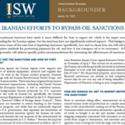 |
 |
Iranian Efforts to Bypass Oil Sanctions

International sanctions have made it more difficult for Iran to export oil, which is the major source of funding for the Iranian regime, but the sanctions have not significantly reduced exports. This backgrounder addresses some of the ways Iran is bypassing sanctions – specifically, how and to whom Iran can still sell its oil, alternative methods for processing payments for oil, and how it can transport oil to its customers. A future backgrounder will address specific policy recommendations for increasing the effectiveness of sanctions.
What are the sanctions and how do they work?
Sanctions against the Iranian regime cover imports and exports of military equipment, material and supplies that could be used in the Iranian nuclear program, business dealings with the Iranian Revolutionary Guard Corps, and other Iranian entities. These sanctions originate from various multinational organizations, including the United Nations and the European Union, as well as individual nations. This backgrounder focuses primarily on U.S. sanctions against the trade in Iranian oil, specifically, the Iranian Transactions Regulations as defined by the U.S. Department of the Treasury's Office of Foreign Assets Control. These sanctions are intended to reduce funding to the Iranian nuclear program, and while they are unilaterally imposed by the U.S. government, they represent the foundation of the international sanctions against the Iranian oil trade, primarily because the vast majority of the international oil trade is denominated in U.S. dollars. Because the majority of international oil trade is denominated in dollars, the U.S. government can unilaterally impose sanctions that restrict the use of the dollar in trading Iranian oil. Whether an individual country such as India wants to comply with the sanctions against Iranian oil is irrelevant when it comes to completing the purchase of Iranian oil using dollars. The U.S. government regulations make it virtually impossible for India, or any other country, to use dollars to purchase Iranian oil.
The U.S. Department of Treasury’s Office of Foreign Assets Control administers the American sanctions against Iran; this agency has implemented a wide array of sanctions over the last few decades. The U.S. has had some version of economic sanctions against the Iranian regime continuously in effect since President Jimmy Carter signed Executive Order 12170 in November of 1979. The current set of sanctions against the Iranian oil trade has gradually increased in intensity since December of 2011 with full implementation scheduled for July of 2012. For all practical purposes, most international financial institutions are already in full compliance to ensure they do not run any risk of being identified by the Department of Treasury as being in non-compliance.
To read more, download the PDF.